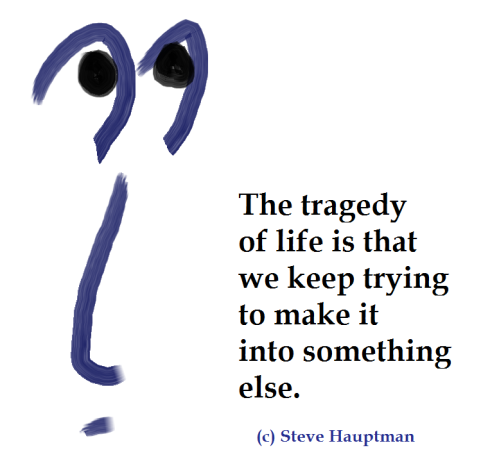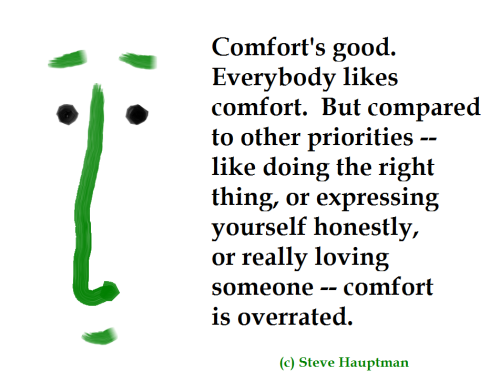Monthly Archives: November 2016

x
May you live in interesting times.
~ Traditional Chinese curse
As we near the end of this horrible, terrible, not-very-good week I find myself having more and more conversations with friends and clients whose mental health took a nosedive on Tuesday.
They are angry, or anxious, or depressed, or grieving, or bewildered, or all of the above.
One client sent me an email describing these feelings, asking, “Should I worry? Or is this the new normal?”
I answered, “I don’t know what the new normal is. But if Facebook is any barometer, you’re not alone.”
That fact has actually helped me more than anything else. Yes, I spend way too much time on Facebook. But this week it really helped me to hear how many people were upset by this clusterfuck of an election. And it helped me to go there and gnash my teeth in public. Misery doth love company.
But I’m also a therapist, and Monday starts a new interesting week, and I expect to be faced with a good deal more misery to come.
Hence this short guide to surviving whatever the hell comes next.
1. Don’t eat garbage.
Garbage means whatever makes you sick. Sick means angry, anxious, depressed or hopeless. Listen to your feelings, and go in the direction they point. Change the channel. Avoid Fox. Avoid Facebook, or at least block anyone whose postings dismay you. Move to another seat, away from the bigmouth who’s gloating. That’s not rudeness, it’s self-defense. Feed yourself good stuff instead. Good food, good music, good friends. Spend time with like-minded people, those who feel the way you do. Even better, take a vacation from politics. (They’ll still be there when you return.) Walk in the woods or on a beach. (Alongside the majesty of nature, politics shrivel in significance.) Drink wine. Drink hot cocoa. Watch Frank Capra movies. Read good books, ones that expand your mind and soul. Or trashy novels that provide delicious escape. Bake cookies and eat them with cold milk. And if you have grandkids, play with them more (which is just what I’m doing right after I finish writing this).
2. Throw the OFF switch.
On the projector in your head, I mean. Yes, terrible things may happen, and no, we don’t want them to. But they haven’t happened yet. And obsessing won’t prevent them. If you must do something, do something constructive. Get political and work to elect progressives. Send money to Planned Parenthood. Join a Black Lives Matter march. Go out of your way to be friendly to the Muslim woman you meet in the produce aisle. Stick a safety pin in your collar. (Unaware of the Safety Pin movement? Scroll down to the bottom of this page.) You’re not helpless; there are many opportunities to do good, and to feel good doing it. But the one thing you should not do is sit in a corner listening to the insane chatter of monkeymind.
3. All politics are personal.
This is something I know but keep forgetting when I go on Facebook and encounter Trump supporters. I forget that we believe what we believe, love what we love, hate what we hate and fear what we fear for subjective reasons. That my political opinions, like a lawnful of dandelions, have roots sunk deep in my personal history, experiences, relationships, aspirations, disappointments and woundings. Deep stubborn roots, many of them hidden even from myself. That my unawareness of these roots only strengthens my faith in my own rightness, and your wrongness if you disagree with me. Hence my self-righteous anger at you. And hence the saying “In politics, as in love, we are often astounded by the choices of others.” I’ll try harder to remember all this next time I’m astounded.
x
*

For more info, Google #safetypin or search
for Facebook posts under that hashtag.
The safety pin drawing at the top of the page
7 Comments | posted in control
 Friday, November 11, 2016.
Friday, November 11, 2016.
Three days after the election of Donald J. Trump.
People marching in the streets.
Clients coming in anxious and depressed about the fate of the nation.
They, like I, fighting off scary projections about what will happen now to minorities, to Obamacare, to Planned Parenthood, to SCOTUS.
What happens with Russia, and ISIS, and abortion rights, and guns in our schools, and Rudy Giuliani as Attorney General.
And the KKK and American Nazis, who seem poised to go mainstream.
And I’m trying my damnedest to be Buddhist about this whole thing.
Because projection is so dangerous.
It’s so easy to scare ourselves shitless.
This Zen story helps me to remember that.
I hope it helps you, too.
Maybe
There was an old farmer who had worked his crops for many years. One day his horse ran away. Upon hearing the news, his neighbors came to visit. “Such bad luck,” they said sympathetically. “Maybe,” the farmer replied. The next morning the horse returned, bringing with it three other wild horses. “How wonderful,” the neighbors exclaimed. “Maybe,” replied the old man. The following day, his son tried to ride one of the untamed horses, was thrown, and broke his leg. Again the neighbors came to offer their sympathy on his misfortune. “Maybe,” answered the farmer. The day after, military officials came to the village to draft young men into the army. Seeing that the son’s leg was broken, they passed him by. The neighbors congratulated the farmer on how well things had turned out. “Maybe,” said the farmer.
3 Comments | posted in control

*
(Sixth in a series. You can read the last post here.)
.
Liz is nervous about entering my therapy group.
“But I don’t know why,” she says.
“I do,” I answer.
“There’s a secret reason for this feeling most people don’t realize,” I say. “When we enter a new group situation we expect the group to treat us as we were treated in our family of origin.
“If our family provided safety and acceptance, we unconsciously expect that from the group. But if our family abused us, we expect the group to abuse us too. If our family was critical or judgmental, we expect the group to be the same. If our family ignored or neglected or dismissed us…. You get the point.”
“Jesus,” mutters Liz, who grew up in an alcoholic family. “No wonder I’m nervous.”
“Right,” I say. “This makes group pretty scary for some people, at least when they start.
“But it’s also an opportunity for real therapy.
“Group provides a chance for what I call a corrective emotional experience. When we find that the bad thing we expect to happen doesn’t — that this group is actually nothing like our family, that here we can actually be ourselves and still feel safe and get our needs met — the kid inside us begins to heal.
“And we come away from group feeling just a bit more adult.”
That last word — adult — is a good way to describe the most adequate any of us ever feel.
True adulthood is much rarer than we suppose. It’s one thing to grow up in external, superficial ways; it’s another to feel adult inside. We look at others living their apparently grownup lives — with their grownup bodies, jobs, houses, money and accomplishments — and think surely they must feel like grownups. But all the people I know well admit to feeling anything like that.
They feel like kids wrapped in adult bodies.
They look forward to feeling as old as they actually are.
Me too.
We feel this way because of the famous Inner Child you’ve heard about. This is the part that never entirely grows up. I see it as a collection of wounds — unmet needs, expressed feelings, unanswered questions, unresolved doubts.
We each have a Kid inside, whether or not we talk about it.
And most of us treat the Kid pretty badly.
“Most adults are ashamed of the Kid,” I wrote in Monkeytraps.
They perceive it as a weakness, a flaw or vulnerability. When the Kid makes an appearance — gets scared or cries, for example — they’re embarrassed. Shut up, they tell it. You make me look ridiculous. Shut up and go away.
This is no accident. It’s the result of being parented by adults who largely forget what it felt like to be powerless, puzzled, and surrounded by giants. And of schools which cram kids into classroom, ignore their needs for freedom, fresh air and play, regiment their behavior and test them into obedience. All of this taught them This is how you treat a kid.*
In therapy we have to decide what to do with this part of us.
I tell clients there are three steps to healing the Kid.
First, you stop the abuse. You bring the Kid out of the closet, stop calling it names, stop shaming it when its feelings come up. This takes a conscious decision and, usually, some external support like that provided by a therapist or therapy group.
Second, you get to know the Kid. What are its needs? What are its wounds? What didn’t it get when you were its age? What scared or traumatized it? Answers to these questions are essential to understanding what triggers the Kid now. Again, to do this work seriously requires a conscious decision, and external permission and support.
Third, you help it grow up. You do this by helping the Kid do things most kids are not permitted by the giants that surround them: tell the truth, express feelings, cry, rage, swear, be funny, be silly, be selfish, play, say No, ask for help, ask to be held. You look for ways to listen for what the Kid needs and, if possible, provide it.
These three steps make up the process of what I call adulting.
The goal of adulting is not to eliminate the Kid, or even get it to grow up all the way. Neither is possible. Each of us is fated to carry some childhood wounds forever. This is sad, and normal.
No, the goal of adulting is simply to help us treat the Kid with compassion and understanding, and to heal what wounds that we can.
Sound frivolous?
It is not.
Such work is necessary to reduce the long-term emotional crippling every kid suffers when compelled to follow a Plan A.
We all have work like this to do.
Sadly, most of us will never do it.
We won’t take the time, won’t see the need, or, most probably, will just be too scared.
“To suffer one’s death and to be reborn is not easy,” wrote Fritz Perls.
Still, neither is the alternative, which is to go through adulthood feeling less than adult.
And so inadequate. Not enough.
Which, as I’ve been suggesting throughout this six-part series, is nothing more than a destructive and unnecessary lie.
___________________
*Monkeytraps: Why Everybody Tries to Control Everything and How We Can Stop (Lioncrest, 2015). Available at amazon.com.
1 Comment | posted in control
 Friday, November 11, 2016.
Friday, November 11, 2016. 











